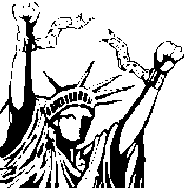All right; it’s time for some political musings!... from a "Libertarian" perspective...
What do we think of when we think of the Bible? The “Good Book.” A book of Faith. The Word of God. All very nice designations. But how often to we dare to think of the Bible as a book of politics? Doesn’t the Bible engender enough religious disputes without throwing politics into the mix? But what if the Bible actually weighs in on political issues and principles relevant to our own times? What if it teaches valuable political lessons that we can’t afford to miss?
It’s important to stress here what I’m not doing. What I write here isn’t a bombastic, “Thus saith the Lord” volume of sermons. It’s not “sectarian” in any way, in the sense of embracing one religious perspective or another. While I have my own faith convictions, I’m not out to proselytize anyone. Rather, I’m looking at holy writ to find practical political advice at a point in our history when we are more divided as a nation than any time since the Civil War. I did not, moreover, set out deliberately to write these reflections. By contrast I came upon these insights from my experience as an educator, and soon realized that the Bible contains an amazing “backstory” that is aching to be told.
Much of what I write is the product of my own classroom instruction, as a professor of Jewish history and biblical literature. As a way of making the biblical narratives come to life, I found that I couldn’t help drawing comparisons between the Bible and the story of America. Ever since my undergraduate studies in American history, I was acutely aware of the tension that existed from the beginning of our republic, between a strong, centralized government, with occasionally heavy-handed authority, and the idea of a diffuse and decentralized loose federation of sovereign states. My most basic adage is this: “Conflict drives everything!”
How sad, as I told my students, that history is rarely taught so as to emphasize the very real disputes that shaped every decade of the American experience. Students are usually just given a set of facts to memorize and dutifully spit back on exams, like a pack of Pavlov’s dogs. How boring! Many of my university students weren’t even aware that there was a lively argument at the founding of the nation about the role government should play in the daily lives of the people. But argue the Founders did, almost coming to blows.
On one side were the Federalists, led by the likes of Alexander Hamilton and John Adams. They favored creating a strong, fiscally sound, central government, using Britain as a model. Their base consisted of urban folk and banking interests. “Big government” was for them more than an ideology; it was a “mantra.” On the other side were the anti-Federalists, championed by Patrick Henry, Thomas Paine, Samuel Adams and Thomas Jefferson, who felt that government is tyrannical by nature and that it must be restrained in order to preserve the fundamental liberties of the individual. They favored a “strict construction” of the Constitution, in order to prevent tyranny and foster the primacy of the “yeoman farmer.” It was their agitation that ultimately led to the Bill of Rights. Their “mantra”: “Don’t tread on me!” Jefferson bitterly opposed the Federalists, becoming convinced that Washington’s successor, John Adams, was leading the country down a very dangerous path. Only his election, as America’s third president, could, he believed, save the republic.
There wasn’t any fence-sitting in those tumultuous days. You girded up your loins and jumped into the fray, because you knew what was at stake. The battle was ferocious, though few of today’s students appreciate the many pivotal moments in the great debate. Think of the issues swirling about, that even the Revolution had left unresolved: What is the role of government? When is government good, and when is it oppressive? How much power can be safely vested in any one leader? The one thing the Founders concurred on to a man is that the power of the federal government must be strictly limited, lest it spiral out of control. The greatest power, they reasoned, should be entrusted to individual states and localities, which are, after all, the most closely connected with the people they represent.
Now, do we see in any of this a reflection of the tension going on in the biblical narratives, or is the Bible such a “holy book” that we never even notice? America’s Founders, all of whom shared deeply religious convictions, certainly did notice, and were convinced, as the adage goes, that those who don’t learn from the mistakes of the past are condemned to repeat them!
More to come...

No comments:
Post a Comment